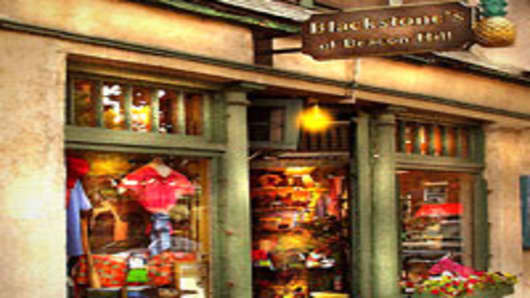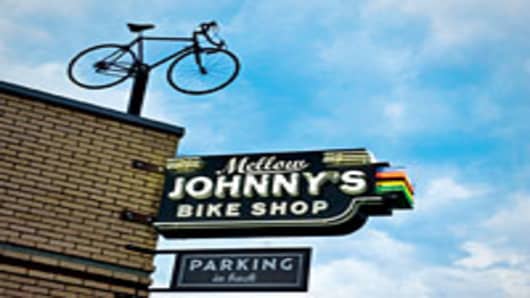Among the list of topics conspicuously absent from political discourse this electioneering season is how to ‘save’ small businesses in an economy that is still finding its feet. Sure, there’s vague talk of 'job creation,' but there aren’t too many ideas of what to do. Right. This. Minute.
As of 2009, locally owned businesses contributed 48 percent of total national retail revenue — down from 59 percent in 1990. There’s little doubt that the eateries, salons, clothing stores and pet shops scattered among America’s neighborhoods need to stay afloat in order to keep the community tax base healthy and its citizens employed.
Enter Small Business Saturday. Started last year by American Express’ OPEN division, the idea is to inject life into the recession-bruised arm of business, with an eye toward creating long-term customers by encouraging spending at neighborhood establishments. They did it with a simple but genius marketing promotion: register your AmEx card via its Facebook page, and get a $25 statement credit – first 200,000 shoppers only! – for a qualifying purchase at participating small businesses.
For this year’s event – Nov. 26, the Saturday after Thanksgiving – the initiative has the weight of last year’s event behind it — along with a recruiting and promotion schedule that started in August, a beefed-up Facebook presence and a series of live events (think block parties and giveaways) in 15 cities. Facebook is one of a few corporate supporters, along with Clear Channel , Google and FedEx . The House of Representatives Small Business Subcommittee even introduced a Resolution on Small Business Saturday last week.
The event should strike a chord on both sides of commerce, with web ads and in-store signage available for commercial participants and a guaranteed run-up of charges for AmEx on that day. But will it also translate into visible long-term business gains for small proprietors?
As the owner of a dozen or so modest-sized enterprises in Texas and other states, including a micro-chain of grocery stores and Mellow Johnny’s Bike Shop in Austin, Craig Staley didn’t see much of a difference in receipts during last year’s Small Business Saturday, and doesn’t expect to see one this year. However, he does appreciate the focus on independents in a city that prides itself on its singularity (consider the popularity of the unofficial city motto “Keep Austin Weird” which sprung out of a backlash against big box stores trying to gain a foothold here in the mid-1990s).
"Frankly, I have some mixed feelings about the sponsor, but anything which promotes healthy business practices and helps keep cities from becoming homogenized has got to be supported,” Staley says, adding that a change in AmEx’s fee structure based more directly on the specific economic characteristics of a company might help even more.
For Jennifer Hill, co-owner of Blackstone’s of Beacon Hill in Boston, there was a bit of an uptick in customers last year; even with a short lead time, the 29-year-old gift boutique was able to take advantage of the signage and other promotional materials offered by American Express.
The fact that the distinguished, half-mile square Beacon Hill district, backed by a strong local business association, is composed almost exclusively of independent stores helps as well. This year, she’s looking for both a one-day boost and an increase in year-round customers, and hopes to gain converts with an additional 10 percent discount and regular engagement through social networks. “Little businesses are lost in the frenzy of Black Friday. Everyone has stolen our thunder, and [this effort] has given us our voice back,” Hill declares.
At New York City’s Tribeca Treats, owner Rachel Thebault also detected a minor positive impact in sales of her cookies, brownies and chocolate specialties but couldn’t quite quantify it, and agreed that learning about it only a few weeks before liftoff didn’t allow her to capitalize on the possibilities as much as she could have.
“Tribeca is a somewhat distinctive Manhattan neighborhood since it has a higher concentration of smaller mom-and-pop stores than many others,” she says, “and is therefore rather uniquely poised to benefit from the program.” She’s anticipating this year’s event, but her expectations are more oriented to the long-term.
Thebault says “I’m not really looking for a big pop that day, but rather just a general awareness of supporting these businesses that will elevate sales both on that day and throughout the holiday season. I think as the years go on and SBS becomes more established as a tradition, then we will see more of a spike on that Saturday in particular.”
Another retailer, A Black Orchid, a flower boutique planted among a mix of store types in Aurora, Colo., is hoping to add about 5 percent to its regular customer rolls to help it recover from the effects of the recession and inroads by bigger chain stores, says shop founder Cheryle Derman.
Truu Salon of Hollywood, Fla., and Town Shop, a well-loved, long-established New York City purveyor of intimate apparel, both missed Small Business Saturday in 2010; by these and other business owners’ accounts, it was introduced too late its first year, and not pushed hard enough to make an appreciable difference. Despite this, American Express measured that day’s totals against those charged on the comparable day in 2009 and found a 28 percent bump in sales, although there’s no way to tell how much of that resulted from a conscious consumer effort to “buy local.” It generated digital heat as well: its 1.5 million Facebook “likes” and 30,000 tweets in a six-week period put it on the same footing as a B-list celebrity, not the usual domain of the credit card space.
"I’m not really looking for a big pop that day, but rather just a general awareness of supporting these businesses that will elevate sales both on that day and throughout the holiday season."
According to Raleigh-based research firm Sageworks, in certain retail sectors, independent shops are showing sharper sales gains than those with bigger footprints these days, the flipside of the first long months of the recession when local shops’ receipts fell faster than those at the publicly traded major retailers.
For example, sales at “private” furniture stores were 4.5 percent higher in 2010 and 7.4 percent higher over the last 12 months, while “public” stores in the sector experienced changes of 1.1 percent and -2.3 percent , respectively. Similarly, over the last 12 months, electronics/appliance store sales jumped 5.8 percent for independents and slipped 0.8 percent at larger outlets.
In Washington, the House has passed 20 job-related bills that could directly help owners of independent stores and service providers through job initiatives. After all, lower unemployment yields higher consumer confidence and more robust spending at all types of shops and on services.
Right now, 19 of those bills await further action, since the Senate hasn’t yet brought any of the measures up for a vote. This status is frustrating to the House’s Small Business Subcommittee, including Rep. Renee Elmers (R-NC), chairwoman of the section that considers issues related to healthcare and technology. Rep. Elmers stated, “The bills are literally scattered on the floor of (Senate Majority Leader) Harry Reid’s office; if you’re looking for jobs, that’s where they are.”
Small Business Saturday hasn’t yet reached the pinnacle of holiday shopping traditions like Black Friday and CyberMonday, but becoming well-known is a bit overrated. On the other hand, it could achieve something truly important: helping to turn the economy around.
email: patricia.orsini@nbcuni.com



